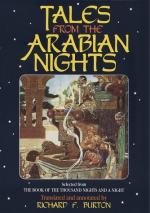[FN#92] Every Eastern city has its special title. Al-Medinah is entitled “Al-Munawwarah” (the Illumined) from the blinding light which surrounds the Prophet’s tomb and which does not show to eyes profane (Pilgrimage ii. 3). I presume that the idea arose from the huge lamps of “The Garden.” I have noted that Mohammed’s coffin suspended by magnets is an idea unknown to Moslems, but we find the fancy in Al-Harawi related of St. Peter, “Simon Cephas (the rock) is in the City of Great Rome, in its largest church within a silver ark hanging by chains from the ceiling.” (Lee, Ibn Batutah, p. 161).
[FN#93] Here the fillets are hung instead of the normal rag-strips to denote an honoured tomb. Lane (iii. 242) and many others are puzzled about the use of these articles. In many cases they are suspended to trees in order to transfer sickness from the body to the tree and whoever shall touch it. The Sawahili people term such articles a Keti (seat or vehicle) for the mysterious haunter of the tree who prefers occupying it to the patient’s person. Briefly the custom still popular throughout Arabia, is African and Fetish.
[FN#94] Al-Mas’udi (chap. xcv.), mentions a Hind bint Asma and tells a facetious story of her and the “enemy of Allah,” the poet Jarir.
[FN#95] Here the old Shiah hatred of the energetic conqueror of Oman crops out again. Hind’s song is that of Maysum concerning her husband Mu’awiyah which Mrs. Godfrey Clark (’Ilam-en-Nas, p. 108) thus translates:—
A hut that the winds
make tremble
Is
dearer to me than a noble palace;
And a dish of crumbs
on the floor of my home
Is
dearer to me than a varied feast;
And the soughing of
the breeze through every crevice
Is
dearer to me than the beating of drums.
Compare with Dr. Carlyle’s No. X.:—
The russet suit of camel’s
hair
With
spirits light and eye serene
Is dearer to my bosom
far
Than
all the trappings of a queen, etc. etc.
And with mine (Pilgrimage iii. 262):—
O take these purple
robes away,
Give
back my cloak of camel’s hair
And bear me from this
towering pile
To
where the black tents flap i’ the air, etc.
etc.
[FN#96] Ai-Hajjaj’s tribal name was Al-Thakifi or descendant of Thakif. According to Al-Mas’udi, he was son of Farighah (the tall Beauty) by Yusuf bin Ukayl the Thakafite and vint au monde tout difforme avec l’anus obstrue. As he refused the breast, Satan, in human form, advised suckling him with the blood of two black kids, a black buck-goat and a black snake; which had the desired effect.
[FN#97] Trebutien, iii., 465, translates these sayings into Italian.
[FN#98] Making him a “Kawwad"=leader, i.e. pimp; a true piece of feminine spite. But the Caliph prized Al-Hajjaj too highly to treat him as in the text.




